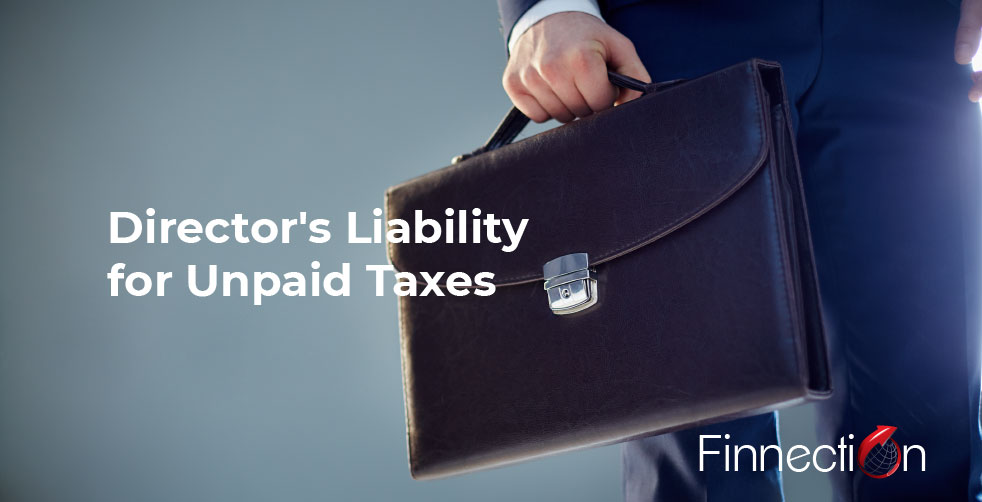Background on Director’s Liability for Taxes:
Involving the liability of directors for unremitted GST/HST, the Tax Court of Canada recently decided a case. In general, for a variety of corporate liabilities a corporation’s directors can be held personally liable to CRA. Corporate liabilities include unremitted GST and HST and unremitted payroll deductions for employees. It is compulsory for the Corporations to remit GST/HST, as well as required wage deductions like CPP/EI and income tax withholdings. Under subsection 227.1(1) of the Income Tax Act, directors may be held personally liable if a corporation fails remit GST/HST and does not have sufficient funds to pay the CRA.

In general, for a variety of corporate liabilities a corporation’s directors can be held personally liable to CRA
Normally, this happens when a company is experiencing financial difficulties. For instance, a business owner in an attempt to save the company may use the funds due and owing to the CRA with a belief once the company starts making money, it will be able to pay off its CRA tax debts. Financing the company in this way may appear to be the easy pick for a business owner with limited tax awareness. Even so, the director can be held personally responsible for the Corporation’s taxes. It is merely a tax trap because a business is incorporated, the owner or director cannot be held culpable for these funds. CRA has the authority to collect personally from the director.
Limitation Period for Director Tax Liability
Section 227.1 contains a number of important provisions and defences to the CRA issuing a director’s liability assessment. The period of limitation of two years is one such defence. No action against a director can be commenced more than two years after director ceased to be a director of the corporation as per Subsection 227.1(4). Simply stated, CRA is barred from collecting the director’s taxes if a director resigns and two years pass. It limits the amount of time that’s why this is known as a “limitation period”.
Zvilna v. Canada [2022] T.C.J. No. 36
Numerous important aspects of the limitation period for director’s liability, edifies through recent Zvilna case. TASAC Ltd, the corporation in question, in the tax year 2009 had unremitted taxes and failed to pay them. On September 30, 2015 (Almost after six years), Under section 227.1 CRA filed a section against the director personally. The key question was about whether Zvilna had stepped down as a director and over two years before the action began.
Regarding the limitation period defence, three basic arguments were made on Zvilna’s behalf. Firstly, Zvilna had verbally stepped down from her role as a director and there was nothing further to do with the company or its directorship. On the other hand, verbal resignation is totally inadequate. Very important section (121(2)) in the Ontario Business Corporations Act (OBCA) that states: “A resignation of a director becomes effective at the time a written resignation is received by the corporation or at the time specified in the resignation, whichever is later.” So, valid resignation should need to be as per corporate law.
Second, the taxpayer claimed that only future condition resignation is sufficient for a resignation. When these conditions are fulfilled still further action are required to resign. As a result, resignation need to be in written form, should be clear and precise. If any future date is mentioned in the resignation than resignation takes effect from that date.
Third, a director has signed and delivered a signed contract verifying his resignation in 2011 to the other director. Before 2011, the event of future resignation clause occurred and in 2011 subsequent agreement was signed but five years ago agreement was ready to be signed. Further evidence also showed that the written termination was a clear termination. Therefore, the judge agreed that the taxpayer could not be held personally liable because the resignation occurred four years before the proceedings were filed.
As a result, prior to the CRA process, the director wrote a resignation four years ago, and the CRA was forbidden to hold taxpayers personally liable.
Pro Tax Tip: Directors Liability Assessments
To minimize the chances of personal liability, it is important to resign from the position of director in writing. Otherwise, the directors can be fully responsible for the company’s tax obligations. Failure to provide written resign may leave you defenceless at the responsibility of the Director. Contact our experienced tax accountant for more information on how to accurately resign from a position of director to avoid tax obligations.
FAQs
How can I resign as a director?
Can CRA come after me if the company I serve on goes bankrupt?
How can I completely avoid the responsibility of the director?
For consultancy and advisory on Unpaid Taxes in Canada, contact finnection via email at info@finnection.ca or call us at (647) 795-5462
Disclaimer: Above information is subject to change and represent the views of the author. It is shared for educational purposes only. Readers are advised to use their own judgement and seek specific professional advice before making any decision. Finnection Inc. is not liable for any actions taken by reader based on the information shared in this article. You may consult with us before using this information for any purpose.
